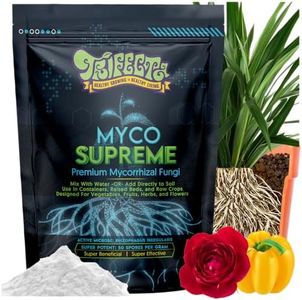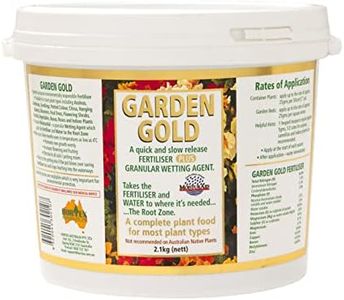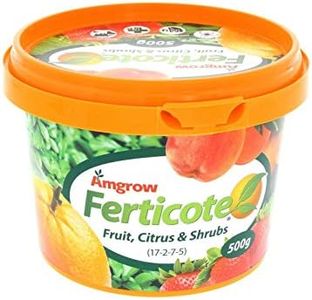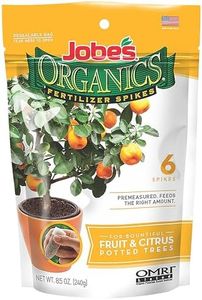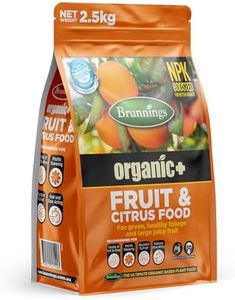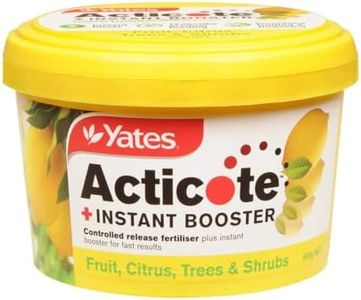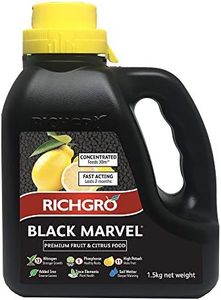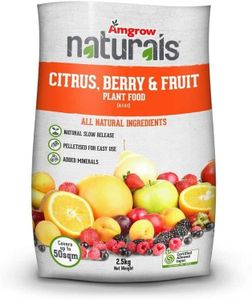We Use CookiesWe use cookies to enhance the security, performance,
functionality and for analytical and promotional activities. By continuing to browse this site you
are agreeing to our privacy policy
8 Best Fruit Tree Fertilizers
From leading brands and best sellers available on the web.By clicking on a link to a third party's website, log data is shared with that third party.
Buying Guide for the Best Fruit Tree Fertilizers
Choosing the right fertilizer for your fruit trees is important because it ensures the trees grow healthy, produce high-quality fruit, and are better protected from diseases and pests. The right fertilizer depends on your tree’s age, the type of fruit, the growing environment, and any specific soil deficiencies you may have. Rather than just picking any fertilizer, it’s a good idea to learn what each key element does and how to match it to your fruit tree’s needs.N-P-K RatioThe N-P-K ratio stands for the percentage of Nitrogen (N), Phosphorus (P), and Potassium (K) in the fertilizer. Nitrogen helps the tree grow leaves, phosphorus supports strong roots and flowers, and potassium aids in fruit development and disease resistance. Fertilizers have different N-P-K ratios for different stages: higher nitrogen is good when the tree is young, while more balanced or higher phosphorus and potassium are better as the tree matures and begins to flower and fruit. Pick a ratio based on your tree’s age—lots of leaves? You may want more nitrogen. Ready to bear fruit? Look for higher potassium and phosphorus.
Form: Granular vs. LiquidFertilizers come in either granular or liquid form. Granular fertilizers are sprinkled on the ground and provide slow-release nutrition over time, which is good for established trees that need steady feeding. Liquid fertilizers work faster and are great for quick boosts or young trees that need immediate help. Choose granular if you want less frequent application and are focused on long-term growth, or go with liquid if you’re solving a specific problem quickly or starting young trees.
Organic vs. SyntheticOrganic fertilizers are made from natural materials and add nutrients slowly, improving the soil’s condition over time. Synthetic fertilizers are man-made and usually work faster, directly feeding the plant. Organic is best if you want to build healthy soil over many years and grow food naturally, while synthetic works well when you need precise control and immediate results. Consider what’s more important for you: long-term soil health or fast, targeted outcomes.
Micronutrients ContentBesides the main nutrients (N, P, and K), fruit trees also need small amounts of other minerals like iron, zinc, magnesium, and calcium. Some fertilizers add these micronutrients, which are especially helpful if your soil is naturally low in them or if your tree shows deficiency symptoms (like yellowing leaves). If you know your soil has enough of these, a regular fertilizer should suffice, but if you have sandy or worn-out soil, choose a fertilizer with added micronutrients.
Time-Release FeatureTime-release or slow-release fertilizers give nutrients to the plant gradually over several weeks or months. This reduces the need for frequent applications and prevents overwhelming the tree with too much at once. Slow-release is great for busy gardeners or trees that need consistent nutrition, while fast-acting options can be chosen for immediate boost or fixing a quick problem.
